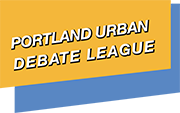Why Debate Matters
Leadership, Empowerment, & Non-Cognitive Outcomes
Debaters are more likely to use their newly developed communication skills to solve conflicts without resorting to violence; to become more connected to their peers and school; to further raise their awareness of social and political issues; and to see themselves as empowered leaders of their communities. In focus groups in the Minneapolis U.D.L., participants reported that they were able to “connect” and develop “bonds” with others, and “[i]n general, debate helped them with relationship skills, including listening to others, negotiation, respect, and sportsmanship.” The students also credited debate with making them more “outgoing, confident, assertive, and outspoken” and giving the students opportunities for “positive interracial contact” [emphasis added] (“2014-15 Urban Debate League MPS Evaluation”, September 2015).
Surveying decades worth of psychological research, one author concluded that debate could give students alternatives to violence because of the importance of civil disagreement within interpersonal relationships (Bellon, “A Research-Based Justification for Debate Across the Curriculum”, Argumentation and Advocacy, Winter 2000). Compared to non-debaters, students in an urban debate league were found to have significantly higher levels of social competence and conscience (Anderson & Mezuk, “Positive Youth Development and Participation in an Urban Debate League”, Journal of Negro Education, Summer 2015).
These relationship skills could be called “leadership” or, from the student perspective, “empowerment.” By teaching better communication skills and imparting the desire to use them, debate participation can vault students into leadership roles, both informal and formal. Students in the Minneapolis U.D.L. reported thinking about social and political issues and “how [they] will affect other people” and wanting to “[grow] up and [do] something about it.” One student said, “you’re more willing to speak up… and just bring issues to light when you’re in debate” and cited specific examples of standing up for friends and issues in school [emphasis added] (“2014-15 Urban Debate League MPS Evaluation”, September 2015).
As one student in a U.D.L., Robb, said to a researcher, “I always wanted to change the world. I just didn’t know how. Debate taught me that it is a process” [emphasis added] (Cridland-Hughes, “Literacy as Social Action in City Debate”, Journal of Adolescent and Adult Literacy, November 2012). This same attitude carries on after school, which is clearly shown by the myriads of former debaters who are in government, law, and in leadership positions in businesses and organizations. One survey showed 80% of members of Congress participated in speech and debate (Swanson, as cited in Parcher, “The Value of Debate”, 1998).
Effects on debaters persist long after participation in debate itself. In an eight-year long, cross-sectional study, Rogers (2005) found former debaters derived numerous long-term benefits, even though the debate and non-debate groups were nearly identical at the start of the study. Even after participation was long in the past, the debaters were significantly more likely to vote and volunteer, to express confidence in their communication skills, to display cultural savvy and acceptance of diverse groups, to maintain long-term relationships, to complete more schooling, and to be more satisfied in their jobs than non-debaters. Debaters were also less likely to suffer from anxiety or depression, to ignore evidence that conflicted with their initial beliefs, and to switch jobs involuntarily than non-debaters. Again, these groups were matched and quite similar before participation in debate began (Rogers, “Graduate School, Professional, and Life Choices”, Contemporary Argumentation and Debate, 2005).
The exact mechanisms of all these benefits would be unclear from quantitative studies alone, but ethnographers have worked closely with urban debate leagues and talked to the participants. The crucial component of the U.D.L.s’ success is that students have their voices heard in debate, providing a “platform” for them to express themselves. When it was their turn to speak, the debaters felt “powerful” because no one, not even the judge, could interrupt them. One student delightfully described wearing squeaky shoes on purpose so that everyone’s eyes would be on him as he walked to the lectern! This sense of empowerment was the primary reason debaters participated (Mathis, “Si Se Puede! (Yes We Can!)”, December 2015).
U.D.L. participation also feeds into an academic identity, which for many of the students is a new-found sense of themselves as connected to the world and part of a scholarly community. “[D]ebate raises the bar in how students see their futures… graduating from high school is no longer the immediate goal or milestone; it is more important to go on to college,” even though none of the participants in this research study had parents who had gone to college [emphasis added]. The debaters suddenly saw themselves on the right path–as good students–and asked for help when they needed it (Mathis, 2015).
Or as one former urban league debater, now a director of forensics, wrote:
Educated in the public school system of inner-city Atlanta, my own high school experience was tragically similar to the one depicted above. My savior… was the Atlanta Urban Debate League. It provided the opportunity to question the nefarious rites of passage (prison, drugs, and drinking) that seem to be uniquely debilitating to individuals in poor urban communities… Debating delivers a galaxy of alternatives and opportunity… Imagine graduating from high school each year millions of underprivileged teenagers with the ability to articulate their needs, the needs of others, and the ability to offer solutions… Urban Debate Leagues offer a pedagogical tool that simultaneously opens the mind to alternatives and empowers students to take control of their lives… The ability to question [everything]… makes debate uniquely empowering for individuals disenfranchised by the current system. (Lee, “Memoir of a Former Urban Debate League Participant”, Contemporary Argumentation and Debate, 1998).
